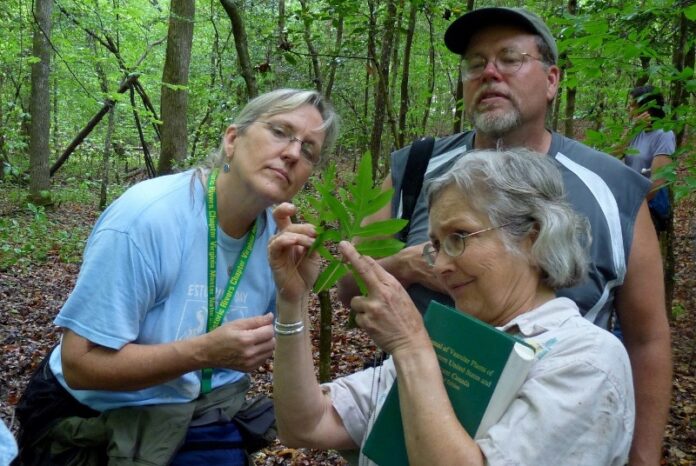
A crowdfunding campaign aims to increase leadership training and administrative support for Virginia’s large corps of 1,800-plus trained master naturalists.
Master naturalists are volunteers who conduct outreach and environmental education, citizen science projects, and stewardship events that are dedicated to the beneficial management of natural resources and natural areas in their communities. Most of the chapter leadership work involves recruiting, training, organizing projects, and tracking volunteer hours.
Currently, more than 300 volunteer leaders in 29 local chapters contribute more than 30,000 hours annually to running most aspects of the Virginia Master Naturalist Program, said Michelle Prysby, program director.
The program, which is jointly sponsored by Virginia Cooperative Extension and several state agencies, is based in Virginia Tech’s College of Natural Resources and Environment. It is supported by a staff of three in the college’s Department of Forest Resources and Environmental Conservation.
“As our chapters grow and evolve, we find there is an increasing need to train and support those local leaders so that we have a strong supply of volunteers who are confident and prepared to take on the leadership roles,” Prysby said. “High-quality local leaders increase the overall impact of our chapters so that they can recruit and retain more volunteers, accomplish more impactful service projects, and ultimately make more significant contributions to natural resource conservation in the commonwealth.”
The crowdfunding campaign goal of $8,400 will help fund four regional leadership days, providing training on effective chapter management, strategies for decision-making and conflict resolution, plans for creating and organizing impactful service projects, and more day-to-day assistance. In addition, online resources (e.g., webinars, manuals, templates) for volunteer leaders will be created.
“In the short term, our crowdfunding campaign will increase volunteers’ willingness to take on and stay in leadership roles, and it will increase their efficacy in those roles,” Prysby said. “In the long term, our project will result in more robust Virginia Master Naturalist chapters that are better at recruiting, retaining, and managing volunteers and partnerships so that they have more positive impacts on Virginia’s woods, wildlife, and waters.”
While the Virginia Master Naturalist Program receives monetary support from agency partners, such as Virginia Cooperative Extension, the Virginia Department of Forestry, and the Virginia Department of Game and Inland Fisheries, “it does not cover all of our baseline budget,” Prysby said. “Philanthropy is critical for helping us sustain and grow the Virginia Master Naturalist Program.”
“When we together support our chapter leaders,” she continued, “we’re supporting all our master naturalist volunteers, making it easier for them to focus their time on conservation projects, like restoring habitat, documenting rare species, and sharing the wonders of nature with Virginia’s next generation of natural resource students.”
The Virginia Master Naturalist Program’s crowdfunding campaign will run through Nov. 15. Supporters can contribute a gift of any amount and help to promote the program on Facebook and Twitter.

